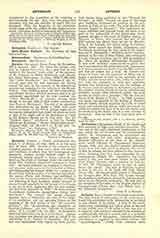

Anthelmi, JOSEPH, a French ecclesiastical historian, b. at Frejus, July 25, 1648; d. in the same city, June 21, 1697. Several of his ancestors had occupied canonries in their native place, the history and traditions of which they had investigated and preserved. Joseph, feeling himself called to the priesthood, betook himself to Lyons, where he entered on the study of theology under the celebrated Jesuit Pere Lachaise, afterwards confessor to Louis XIV. On being ordained, he returned to Provence, and was soon made canon of the Cathedral of Frejus, notwithstanding his natural dislike for a position so ill according with his habits of retirement and study. His uncles, Pierre and Nicolas, had published a work on the former incumbents of the See of Frejus; and following in their footsteps, Joseph resolved to devote himself especially to the history of the Church in his native land, beginning with his own diocese. His first work appeared in 1680, “De initio ecclesiae Forojuliensis dissertatio chronologica, critica, profano-sacra”. The learned but erring Pasquier Quesnel, once an Oratorian, was then at the height of his reputation, and was agitating France on the question of the real author of the “De vocatione gentium”, the “Responsiones pro Augustine ad Capitula Gallorum” and the “Epistola ad Demetriadem” (P.L., LI, 647, 158; LV, 162). In his opinion these had been written by St. Leo the Great. Against him Anthelmi now entered the field on behalf of the authorship of St. Prosper of Aquitaine. The contest was maintained with vigor by both parties, their letters being published in the “Journal des Savants”, in 1689. Toward the close of the same year Anthelmi vindicated his position by the publication at Paris of his work “De veris operibus SS. Patrum Leonis et Prosperi”. The opposition between Anthelmi and Quesnel burst out anew in regard to the authorship of the Athanasian Creed. Quesnel thought it the work of Vigilius, Bishop of Thapsus, in Africa, who towards the end of the fifth century was driven from his see by Huneric, King of the Vandals, and taking refuge in Constantinople wrote against the Arians, Eutychians, and Nestorians, attributing his own works to St. Augustine and St. Athanasius. Anthelmi, on the contrary, inclined to the view of Pere Pithou, who attributed it to St. Vincent of Lerins; and in 1693 he published his “Nova de symbolo Athanasiano disquisitio”. In this work Anthelmi endeavored to prove that the Creed cannot be the production of St. Athanasius, as it was composed not earlier than the fifth century; and that its author was a Gaul. St. Vincent was known to have had the intention of filling out at length a confession of faith in the mysteries of the Trinity and the Incarnation; this, taken in conjunction with the similarity of style and expression between the Athanasian Creed and the writings of St. Vincent, is the foundation of Anthelmi’s argument. His brother, Charles, Bishop of Grasse, collected and published several other historical papers, the most notable of which was a pamphlet, “On the Life and Death of St. Martin of Tours”. In 1694, Anthelmi was made vicar-general to the Bishop of Pamiers; but his health, already impaired by a life of severe study and unremitting labor, could not stand the additional strain put upon it by his new duties, and he returned to his native city in a vain attempt to recuperate. Here he died in the forty-ninth year of his age.

